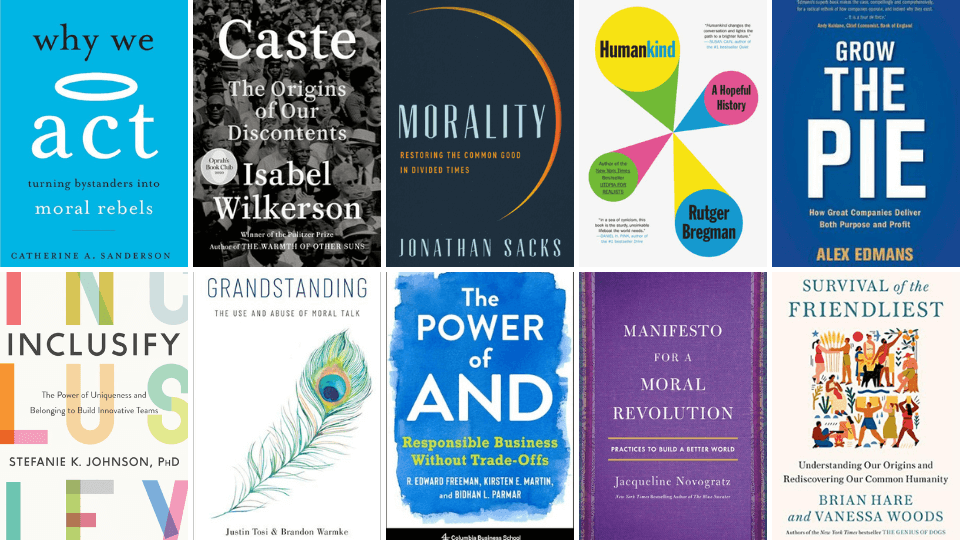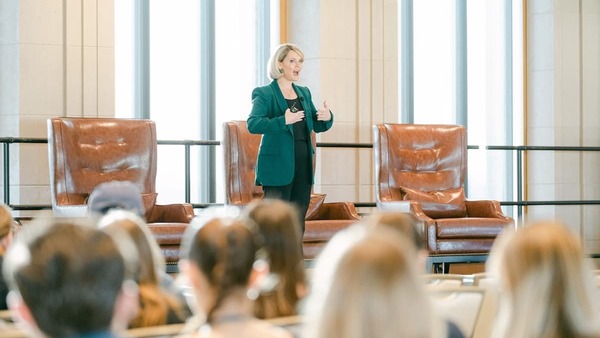
A New Reality, a New Way of Thinking
“A new type of thinking is essential if mankind is to survive and thrive at higher levels,” wrote Albert Einstein in the aftermath of the Second World War. Many leaders have found something similar to be true during COVID-19.
So when lockdowns began in March and books sales surged and book clubs flourished online, many leaders turned to reading, too. They weren’t just looking for comfort and a chance to unplug from the constant onslaught of bad news. They were also looking for a chance to break from old ways of thinking and gain the new ideas necessary to survive and thrive in a changed reality.
Many of the best leaders have been doing this for a long time. They suggest that the bigger a problem is, the more reading and reflection it requires. Bill Gates began taking regular “think weeks” devoted to reading and solitude in the 1990s while he was still at the helm of Microsoft. Then, as he shifted his focus toward global problems—like eradicating polio and reinventing nuclear energy—he began spending even more time with books.
Like Gates, today’s leaders find themselves taking on larger issues than ever—issues like a lack of trust in society, the future of capitalism, and systemic racism. They know that it takes moral courage to stand for the best that human beings are capable of and, as we say at the Mendoza College of Business, “Grow the Good in Business.”
The Notre Dame Deloitte Center for Ethical Leadership selected the books for this year’s list of Best Books for Ethical Leaders with these concerns in mind. The books listed here have helped us find a higher—and more hopeful—way of thinking during the pandemic. We know they can help you emerge from the mire of 2020 ready to lead your team into a better and brighter 2021.
Find Common Ground
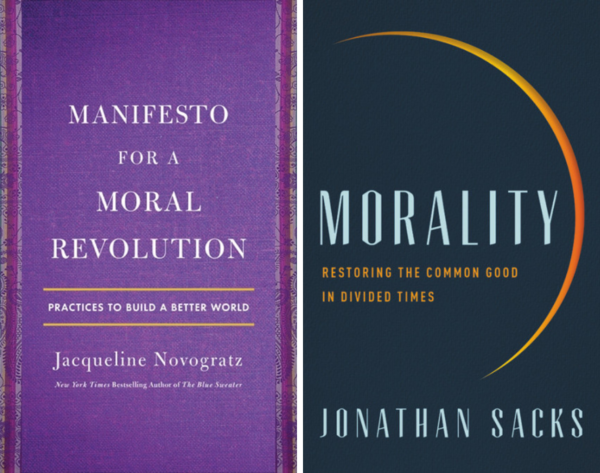
Manifesto for a Moral Revolution: Practices to Build a Better World by Jacqueline Novogratz
Morality: Restoring the Common Good in Divided Times by Jonathan Sacks
We’re familiar with the idea that morality divides us. But can it also bring us together? Acumen CEO Jacqueline Novogratz’s Manifesto for a Moral Revolution shares the moral vision that has helped her bring together the rich and the poor, the public sector and the private sector, in order to tackle tough problems in developing countries around the globe. While her manifesto offers a healthy dose of inspiration, it supports its bold vision with a set of practices for anyone who wants to make their life and work more meaningful and more impactful. Similarly, Rabbi Jonathan Sacks’s book, Morality, published just before his death in November, shows us that we are not “destined to live with ever more divisive politics and ever more divided societies.” Drawing upon fifty years of experience as a philosopher and religious leader, he shows how “we can use this rare moment to enhance the structures of our togetherness.”
Combine Purpose and Profit
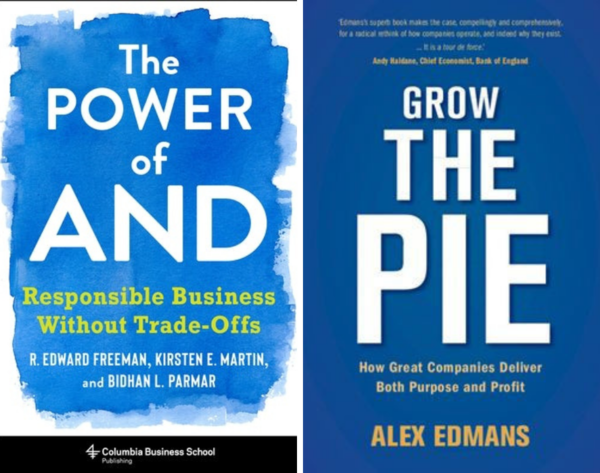
The Power of And: Responsible Business Without Trade-Offs by R. Edward Freeman, Bidhan L. Parmar, and Kirsten Martin
Grow the Pie: How Great Companies Deliver Both Purpose and Profit by Alex Edmans
2020 marks half a century since Milton Friedman argued that "There is one and only one social responsibility of business—to increase its profits.” However, times have changed. As BlackRock CEO Larry Fink puts it, “The public’s expectations of your company have never been greater. Society is demanding that companies … serve a social purpose.” In The Power of And, three eminent scholars (including Notre Dame’s Kirsten Martin) update Friedman’s view by showing that “the idea that business is only about money doesn’t hold true in the 21st century, when companies around the world are giving up traditional distinctions in order to succeed.” And in Grow the Pie, economist Alex Edmans brings a comprehensive data-driven approach to answer the same question: Can companies both do good and do well? His answer, like the one given by Freeman, Parmar, and Martin, is a resounding, “Yes.”
Foster Justice and Inclusion
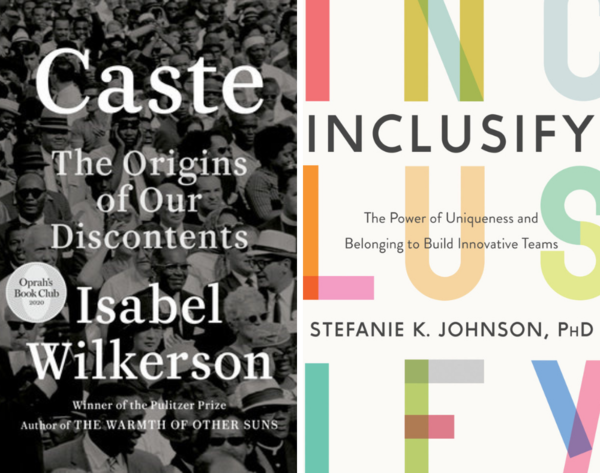
Caste: The Origin of Our Discontents by Isabel Wilkerson
Inclusify: The Power of Uniqueness and Belonging to Build Innovative Teams by Stefanie K. Johnson
In the months following the death of George Floyd in Minneapolis, MN, between 15 and 26 million people in the U.S. participated in protests and demonstrations, with as many as 550 different protest sites on a single day. Clearly, 2020 was a watershed moment for racial justice. Leaders looking to understand the causes and consequences of racism in the United States can look to Caste: The Origin of Our Discontents by Pulitzer Prize winner Isabel Wilkerson. Wilkerson employs the ancient term “caste” to help us see the infrastructure that undergirds racial inequality in the United States. In Inclusify, Stefanie K. Johnson shares the leadership skills required to make inclusion a reality. She also explains why sustained diversity and inclusion efforts make for more engaged, empowered teams and ultimately greater effectiveness all around.
Practice the Art of Moral Influence
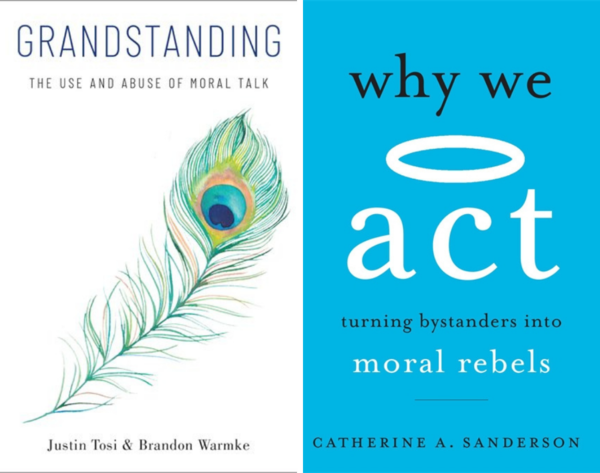
Grandstanding: The Use and Abuse of Moral Talk by Justin Tosi and Brandon Warmke
Why We Act: Turning Bystanders into Moral Rebels by Catherine A. Sanderson
If you've tried to have a conversation about an important moral issue lately, you may have noticed that it devolved into outrage or posturing. In Grandstanding, philosophers Justin Tosi and Brandon Warmke provide a diagnosis of what's gone wrong with moral talk in the digital age. They identify "grandstanding" as the root of the problem, and they explain how to spot it and avoid it when you speak your mind about what matters most. In Why We Act, Catherine Sanderson looks at a related problem: Why don’t we take a stand when we know we should? Sanderson was inspired to write Why We Act after a college freshman in her son’s dorm died twenty hours after he had a bad fall while drinking. Why, she wondered, didn’t anyone act sooner to save his life? Sanderson provides lessons from neuroscience to explain how some simple strategies can help us fight the pressure to conform and develop moral courage.
Cultivate a Positive View of Humanity
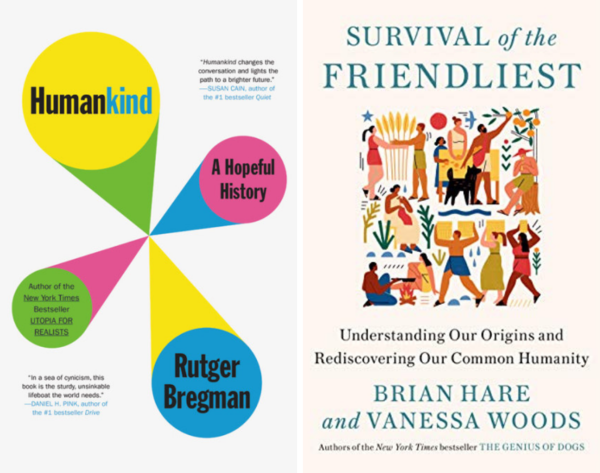
Humankind: A Hopeful History by Rutger Bregman
Survival of the Friendliest: Understanding Our Origins and Rediscovering Our Common Humanity by Brian Hare and Vanessa Woods
In Humankind, Rutger Bregman tells true stories that reveal humans are driven by much more than narrow self-interest. Among Bregman's many true tales of kindness is one he calls "The Real Lord of the Flies." In 1965, Bregman explains, six boys between the ages of 13 and 16 set sail from Tonga and found themselves shipwrecked together on a deserted island. But unlike The Lord of the Flies—the classic novel by William Golding—which ends with barbarity and violence, the story of these Tongan teenagers has a happy ending: When the boys were rescued 15 months after their shipwreck, they were not only alive and well but had formed a peaceful, cooperative society together.
It's stories like this one that allow Bregman to conclude, "To believe that people are hardwired to be kind isn’t sentimental or naïve. On the contrary, it’s courageous and realistic to believe in peace and forgiveness.”
Researchers Brian Hare and Vanessa Woods tell a similar story about human nature—but one that is even broader and deeper than Bregman's. They look at the history of human survival itself. They explain that our species' superpowers—the ones that have sustained us through many millennia—are not intelligence or ruthlessness, but rather cooperation and compassion. Our story, in other words, is not defined by the "survival of the fittest" but rather the "survival of the friendliest."
Hare and Woods conclude that "Our lives should be measured not by how many enemies we have conquered, but by how many friends we have made. That is the secret to our survival."
The Complete 2020 List of Best Books for Ethical Leaders
